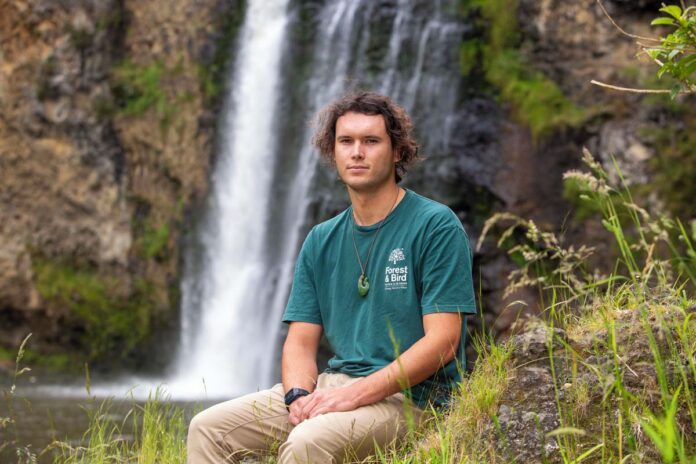Forest & Bird has taken a leading role in many local conservation projects throughout East Auckland. Recently, we landed an interview with Carl Morgan, Forest & Bird’s Auckland Regional Conservation Manager, to learn more about his work.
How did you become interested in conservation?
Born in Port Waikato, I spent my childhood exploring sand dunes and surrounding maunga, as well as the mighty Waikato River. My love and respect for nature is a natural consequence. I was surrounded by native birds and some special marine species. I had unusual adopted ‘pets’ for short stints (my mum worked for a local vet) including seals and penguins, and I surfed with the nationally critical Māui dolphin. After these experiences, I don’t know how I couldn’t end up in a role involving conservation!
What’s the aim of Forest & Bird? how important is its work and what does your role entail?
Forest & Bird is a leading independent conservation organisation. For 100 years, it has been a voice for nature, protecting and restoring wildlife and wild places. Advocating for change at central governmental level, we reference the ‘boots on the ground mahi’ done throughout the motu. It’s very powerful to be doers as well as advocates and I am honoured to play my part in this.
My role involves contributing to local council planning and policy. Then there are campaigns, such as Arohatia Tīkapa Moana Love the Gulf campaign, to protect our ‘big blue backyard’ by ending bottom trawling and significantly reducing sediment entering the environment. The rest of my time is spent on general advocacy, supporting our amazing branch volunteers and working towards better outcomes for nature.
What is the 26 Forest & Bird Centennial project?
This project highlights volunteers’ important contribution in restoring nature. In Auckland, they’ve been inspired by Ngaheretuku Reserve, but Forest & Bird worked with writers and artists visiting conservation projects around the country. They’ve created essays, poems and other artworks inspired by the landscape, people, species and conservation challenges. It is part of our year-long centennial programme, which is a real celebration of all Forest & Bird has achieved.
Are Predator Free 2050 targets attainable? How useful are 1080 drops in the Hunua Ranges?
They’re ambitious, which is exactly what we need. We aren’t going to get there unless we lift our game and invest in nature, instead of cutting Department of Conservation (DOC) funding. Everyone needs to play a part, that includes hunters, but we need large scale pest control – we can’t hunt our way out of this problem.
Forest & Bird supports use of biodegradable 1080 baits. Pests can be down to near zero within days of [aerial] drops, allowing birds to nest in peace. Very few (if any) native birds are attracted to them. That’s why 1080 operations in the Hunua Ranges have been so successful. However, there’s a lot more to this issue, so we’re happy to go into detail on request.
The puteketeke (Australasian crested grebe) won the Bird of the Century poll in a landslide thanks, in no small part, to a campaign by TV’s John Oliver. How beneficial was the poll and his contribution?
John Oliver’s team asked if he could be a campaign manager and we said yes, but we were astounded by the number of votes and donations his international campaign raised.
Overall, the effort and creativity from campaigners was incredible! It was a great win for our native manu, opening opportunities to talk about the many threats native birds face with people, including many who wouldn’t know a grebe from a gull!
If you could grow any plant or raise any animal (real or imagined), what & why?
The Māui dolphin. I’d love to help boost their numbers and see them out in the surf for years to come. Their status is nationally critical with only around 48-68 of them left, which is heartbreaking. They’re under a lot of pressure due to climate change and how people interact with their environment.
If you could be Minister of Conservation for one day, what would you do first and why?
I’d appropriately fund my department! DOC has a budget about the same as the Christchurch City Council’s but looks after a third of Aotearoa and all its indigenous species. DOC needs significantly more funding to maintain tracks and huts (also good for tourism), remove pests and protect and restore indigenous forests and wetlands, combatting the dual biodiversity and climate crisis. Our backyard is a huge part of our identity and must be protected.
If you could invite three people (living or dead) to dinner, who and why?
Captain Ernest ‘Val’ Sanderson, our founder – to learn more about his vision and perspective on our work. Sir David Attenborough – that iconic voice and hearing about his many incredible experiences would be beyond amazing! Lastly, Kelly Slater – as I have a passion for surfing it’d be epic to talk with the most successful surfer of all time.

